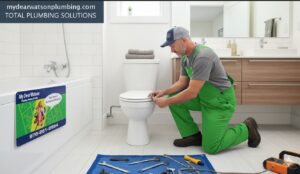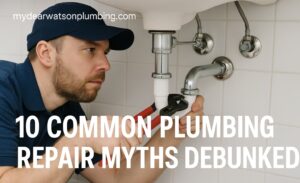Introduction: Understanding the Truth Behind Plumbing Myths
Welcome to the world of plumbing—a domain where myths often flow as freely as water from a faucet. You may have heard ancient stories about how to tackle plumbing repair tasks, such as repairing a leaky pipe or resolving a stubborn blockage. While these stories can be entertaining over a cup of coffee, they’re not always reliable. In fact, some myths can cause more harm than good if taken at face value.
Let’s face it, with water damage contributing to over 25% of all home insurance claims, it’s crucial to sift the facts from fiction before you find yourself knee-deep—in both water and unnecessary expenses.
The Power of Misinformation
The real trouble with plumbing myths is that they’re often passed down like family recipes—each version slightly altered until it’s hard to know what’s true and what’s pure fabrication. Here are some common misconceptions:
- “A dripping faucet is merely a small nuisance.” – Actually, those drips can waste up to 3,000 gallons of water annually!
- “Flushable wipes won’t harm your plumbing.” – Contrary to popular belief, these “flushable” items can contribute to significant clogs.
- “All pipes are created equal.” – Not all pipes have the durability and performance level you’d expect; choosing the wrong material could lead to costly repairs.
Simplifying Complex Solutions
At My Dear Watson Plumbing, Heating, & Cooling, we believe in making complex plumbing solutions easy to understand (and maybe even fun!). Our goal is to equip you with accurate knowledge, whether you’re contemplating an eco-friendly upgrade or require urgent repairs.
So buckle up as we debunk common plumbing myths that could otherwise leave you in deep waters. After all, when it comes to maintaining your home or business’s plumbing systems in Chelmsford, MA, knowledge is power!
Myth #1: All Plumbing Repairs Require an Emergency Call
Picture this: it’s 3 AM, and you hear a mysterious drip, drip, drip. The panic sets in—time to call for emergency plumbing repair, right? Not so fast! Contrary to popular belief, not every plumbing hiccup demands immediate attention. Let’s dive into why you can rest easy and what truly warrants a midnight call to our trusty team at My Dear Watson Plumbing, Heating, & Cooling.
Understanding the Urgency
- Slight Drips: A minor faucet leak might be annoying but often doesn’t need instant fixing. Did you know that toilet repairs account for a significant portion of service calls? Yet most of these aren’t emergencies.
- Low Water Pressure: If your shower turns into a trickle, it could be as simple as cleaning out mineral deposits from the showerhead.
- Noisy Pipes: Those banging noises might just be “water hammer,” which is disturbing but not dangerous. It can often wait until regular business hours for a look-see.
Legitimate Emergency Situations
- Burst Pipes: This disaster has the potential to cause a multitude of issues and requires immediate attention to prevent your living room from turning into an indoor swimming pool.
- Sewer Backups: Raw sewage in your home is both unsanitary and hazardous—definitely an emergency!
- No Hot Water: Especially during a Massachusetts winter, no hot water can quickly become more than just inconvenient. Check out our tips on preventing issues like frozen pipes in our guide here.
What should be the key takeaway? While we are always prepared for any issue, day or night, many issues can be resolved with routine maintenance or simple fixes that can wait until morning. Knowing when to act immediately and when to schedule service during regular hours saves both stress and money. Your friendly neighborhood My Dear Watson team is here to provide clarity—and maybe even some peace of mind—in all your plumbing adventures!
Myth #2: A Leaky Faucet Is Harmless
Picture this: you’re lounging on the couch, binge-watching your favorite series, when a familiar sound enters the room. It’s the familiar sound of a leaky faucet. Annoying? Yes. Harmful? Many would argue not. However, this common plumbing myth begins to unravel.
The Unseen Costs of a Drip
While that dripping faucet might seem like just a minor nuisance, it can actually lead to significant consequences for your wallet and the environment. According to the U.S. Environmental Protection Agency (EPA), a leaky faucet that drips at one drop per second can waste over 3,000 gallons of water per year. That’s enough water for more than 180 showers! [source]
The Impact on Your Water Bill
- Increased Costs: Every extra gallon used unnecessarily adds up on your monthly water bill. Over time, this could mean shelling out hundreds of dollars for water you didn’t even use.
- Potential Damage: If left unchecked, leaks can lead to more severe damage in your plumbing system, potentially escalating into problems that require major repairs or replacements.
The Environmental Toll
Water is a precious resource, and wasting it means contributing to larger environmental issues like droughts and depleting local water supplies. Opting for eco-friendly plumbing solutions not only minimizes this waste but also helps conserve resources for future generations.
Quick Fixes and Professional Help
If you’re handy with tools—or ambitious enough to try—fixing a leaking faucet could be as simple as tightening a valve or replacing a worn washer. However, if DIY isn’t in your skill set or if the leak persists despite your efforts, it’s wise to seek help from experienced local plumbers who specialize in residential plumbing services.
Your trusty Chelmsford experts at My Dear Watson Plumbing, Heating, and Cooling are on standby to address any plumbing maintenance needs you might have—whether it’s an elusive faucet leak or any other nagging issue you can’t quite fix alone. Don’t let that drip continue; tackle it head-on with professional plumbing consultation today!
For more insights on maintaining an efficient home setup with eco-friendly options, check out our article on Earth Day and Eco-Friendly Plumbing Solutions in Massachusetts.
Myth #3: Chemical Drain Cleaners Are Safe for Pipes
Ah, the allure of chemical drain cleaners: a quick, seemingly magical solution to your stubborn clogs. Just pour, wait, and voilà! Your pipes are free-flowing once again. Or are they?
The Harsh Reality of Chemical Cleaners
While chemical drain cleaners might seem like an effortless fix, they come with a multitude of hidden risks. These potent solutions often contain harsh chemicals like sulfuric acid or sodium hydroxide, posing significant threats to both your plumbing and the environment.
- Pipe Damage: Repeated use can lead to corrosion, especially in older pipes made of metal. This corrosion can result in leaks and expensive pipe replacement services.
- Health Hazards: The fumes from these chemicals can be harmful if inhaled and dangerous if they come into contact with skin or eyes.
- Environmental Impact: When these chemicals enter our water systems, they can cause serious harm to aquatic life and contaminate drinking water sources.
The Eco-Friendly Alternative
If you’re looking for safe and effective ways to clear clogs without the risk, consider eco-friendly plumbing solutions. Natural alternatives such as baking soda combined with vinegar or employing mechanical methods like a plunger or drain snake can often do the trick without harming your pipes or the planet.
Your local plumbing experts at My Dear Watson Plumbing, Heating & Cooling specialize in providing sustainable and effective drain cleaning options that prioritize the health of your home’s plumbing system. For more information on how to protect your pipes from damage while keeping them clean, refer to our detailed guide on eco-friendly plumbing solutions.
A Friendly Piece of Advice
Remember, while chemical drain cleaners might promise instant results, they often leave behind long-term problems. So next time you face a clog, resist the temptation of those bright bottles on store shelves. Instead, reach out for professional plumbing consultation or try safer alternatives that won’t turn your pipes into Swiss cheese!
Myth #4: DIY Plumbing Repairs Are Cost-Effective
Ah, the allure of DIY plumbing. With a wrench in one hand and a YouTube video playing on your phone, you might feel like the next Bob Vila. However, when it comes to plumbing repair, saving a few bucks with do-it-yourself methods can often lead to costly mistakes.
The Hidden Costs of DIY Plumbing
While it’s tempting to tackle that leaky faucet or clogged drain on your own, consider the hidden costs:
- Time-Consuming: What seems like a quick fix can often spiral into hours of frustration.
- Lack of Proper Tools: Professional plumbers use specialized tools that aren’t typically found in the average homeowner’s toolbox.
- Potential for Error: A misstep in repairing a pipe or installing a fixture can lead to water damage and more extensive repairs down the line.
According to the Insurance Information Institute, water damage is one of the most common causes of home insurance claims in the U.S., costing billions annually. So while DIY may seem budget-friendly initially, it could end up draining your wallet faster than you can say “emergency plumbing repair.”
Expert Guidance is Key
If a seemingly simple fix tempts you, keep in mind that professional services aim not only to handle crises but also to prevent them. Expert plumbers provide thorough plumbing inspections and offer solutions that ensure long-term efficiency and safety—something your trusty wrench can’t guarantee.
Choosing the right local plumbing service is essential for safeguarding against potential do-it-yourself disasters. Skilled professionals bring not only expertise but also peace of mind.
A Little Humor Goes a Long Way
The next time you’re tempted to play weekend warrior plumber, remember this: just because you’ve watched all seasons of “Fixer Upper” doesn’t mean you’re ready to tackle that burst pipe fix solo. Sometimes it’s best to leave it to the professionals—after all, even Bob Vila knew when to call in an expert!
Myth #5: Low Water Pressure Is Unfixable
Ah, the dreaded low water pressure—often whispered about in hushed tones and resigned sighs. It plagues many shower enthusiasts. But fear not, because this plumbing woe is far from unfixable! In fact, understanding the root causes can lead you to effective solutions that will have you singing in the shower once more.
Understanding the Causes of Low Water Pressure
- Clogged Pipes: Over time, mineral deposits and debris can accumulate within your pipes, restricting water flow and causing that trickle you’re all too familiar with.
- Corroded Plumbing: Older homes often have galvanized steel pipes prone to corrosion, which narrows the pathway through which water can travel.
- Faulty Faucets or Fixtures: Sometimes, the issue isn’t with your pipes at all but rather with malfunctioning faucets or valves that need repair or replacement.
- Main Shut-Off Valve Issues: Check if your home’s main shut-off valve is fully open. A partially closed valve can drastically reduce water pressure throughout your home.
If any of these sound familiar, you’re not alone! Common issues like water heater malfunctions, clogs, and pipe corrosion are recurring themes in many households across Chelmsford, MA. For instance, something as simple as sediment buildup in your water heater could significantly affect pressure levels (WaterHeaterHub.com). As daunting as these problems may seem at first glance, they are essentially invitations for a thorough plumbing inspection by experienced local plumbers who know exactly how to tackle them.
The Solution: Expert Plumbing Services
Here’s where licensed plumbers come into play. An expert from My Dear Watson Plumbing Heating and Cooling can conduct a comprehensive evaluation of your plumbing system to identify and resolve low water pressure issues efficiently. Leveraging advanced diagnostic tools for water leak detection services, they can quickly pinpoint problematic areas and implement targeted solutions like pipe replacements or professional drain cleaning.
A common misconception is that any plumbing fix will leave a gaping hole in your wallet—but fret not. Many fixes for low water pressure problems are both quick and affordable (HomeAdvisor). The key lies in prompt action; ignoring these signs could lead to more severe problems down the line.
No homeowner should settle for subpar showers or dribbling faucets. With trusted local experts ready to assist you with tailored solutions and friendly advice, achieving optimal water pressure is just a call away. So, next time someone suggests that low water pressure is an unsolvable mystery, feel free to debunk that myth with confidence!
Myth #6: Only Cold Climates Face Frozen Pipe Problems
In the vast realm of plumbing repair myths, the notion that frozen pipes are exclusively a problem for cold climates is like believing unicorns are the sole guardians of rainbows. This misconception can lead to unexpected and costly damages, even in regions that typically bask in warmer weather.
Understanding the Enemy: How Pipes Freeze
While it’s true that frigid temperatures increase the risk of frozen pipes, fluctuations in temperature, lack of proper insulation, and sudden cold snaps can cause pipe freezing issues anywhere. When water within pipes freezes, it expands, potentially causing cracks or bursts—resulting in problems that could put a serious damper on your day. Imagine waking up to an impromptu ice fountain in your basement; not exactly the picturesque winter wonderland one might hope for!
Pipes at Risk: It’s Not Just About Geography
- Uninsulated Areas: Pipes running through uninsulated spaces such as garages, attics, or crawl spaces are especially vulnerable.
- Poorly Sealed Homes: Homes without proper sealing may have drafts that contribute to unexpected freezes.
- Sporadic Cold Weather: Even regions known for their mild climate can experience sudden dips in temperature that catch homeowners off guard.
If you’re living in Chelmsford, MA, or nearby areas, preparing for unexpected weather changes is essential. For more tips on preventing frozen pipes regardless of your climate zone, refer to our guide on Winter Plumbing Woes: How to Prevent Frozen Pipes in Massachusetts.
Avoiding Frosty Surprises
As they say, prevention is more effective than cure. Here are some proactive steps you can take to safeguard your plumbing system against unexpected freezes:
- Insulate Pipes: Use foam sleeves or heat tape to insulate exposed pipes.
- Seal Gaps: Check your home’s exterior for cracks and seal them thoroughly to prevent drafts.
- Let Faucets Drip: Allowing a small trickle of water keeps it moving and reduces freeze risks.
No matter where you live, being prepared for potential plumbing predicaments ensures peace of mind all year round. Remember, a little vigilance goes a long way—and with expert help from local professionals like My DearWatson Plumbing Heating and Cooling at hand, you’ll always be one step ahead when it comes to protecting your home’s comfort and efficiency.
If you have any concerns about frozen pipes or need assistance with any plumbing issues—from heating services to emergency plumbing repairs—we’re here to help with reliable solutions tailored just for you!
Myth #7: Small Leaks Don’t Need Immediate Attention
You’ve probably heard the saying, “A stitch in time saves nine.” Well, when it comes to plumbing repair, this proverb holds more water—quite literally! Ignoring small leaks as harmless could result in larger, more costly problems in the future.
Why Small Leaks Matter
- Water Waste: A drip from a leaky faucet can waste more than 3,000 gallons of water per year. That’s enough to fill a swimming pool! In addition to increasing your expenses, this waste also depletes valuable resources.
- Structural Damage: Even the smallest leak can cause significant damage over time. Water can seep into walls and floors, leading to mold growth and compromising structural integrity. It’s not just about residential plumbing services; your home’s very framework could be at risk.
- Escalating Repair Costs: Ignoring a small leak is like ignoring the check engine light on your car. What starts as a minor issue could escalate into needing an entire pipe replacement, which could have been avoided with early intervention.
The Domino Effect: From Drips to Disasters
A classic example is the humble toilet. A minor leak here might not seem urgent, but unchecked drips can lead to more serious bathroom plumbing issues. In addition to increased water bills and potential repair costs, mold poses a silent threat. According to the Centers for Disease Control and Prevention (CDC), mold can pose health risks, especially for individuals with asthma or allergies.
Proactive Plumbing: The Smart Move
The next time you spot a leak—even if it’s just an annoying drip-drip-drip—consider it an opportunity. While it’s tempting to delay addressing these minor issues in favor of bigger tasks (or another episode of your favorite show), opting for quick plumbing fixes now will save you headaches later. Plus, tackling leaks promptly aligns with our commitment to eco-friendly plumbing solutions, reducing waste and conserving water.
If you’re unsure about how to address these issues or need help finding that elusive source of dripping sounds keeping you up at night, consider reaching out for a professional plumbing consultation. Our team of experienced local plumbers is always ready to lend a hand—or wrench!
Myth #8: Toilets Only Clog from Solid Waste
Let’s face it, the mysterious workings of a toilet are not something most of us ponder over our morning coffee. But when you hear that unmistakable gulping sound indicating a clog, it’s easy to pin the blame on solid waste alone. However, this is one plumbing myth that deserves a thorough flushing out!
Why Toilets Clog: Beyond the Obvious
While solid waste is indeed a common suspect in toilet clogs, it’s far from being the only culprit. In fact, a variety of unexpected items and issues can contribute to an obstinate blockage.
- Flushable Wipes: Despite their misleading name, “flushable” wipes are not as toilet-friendly as they claim to be. According to Consumer Reports, these wipes often fail to break down quickly in water and can cause major clogs.
- Feminine Products: Items like sanitary pads and tampons are designed to absorb moisture and expand, which means they can easily snag inside plumbing lines.
- Excessive Toilet Paper: While it’s meant to dissolve, using too much at once can overwhelm your pipes. Remember what mom said: “Everything in moderation!”
- Kiddie Toys: Yes, those tiny race cars and action figures seem perfectly sized for the potty but are decidedly unwelcome guests in your plumbing system.
- Poor Water Pressure: If your water pressure is low, it might not be strong enough to push waste through your pipes effectively.
The Role of Regular Maintenance
A little proactive maintenance goes a long way toward preventing these pesky clogs. Engaging with reliable plumbing services for routine inspections can help identify potential issues before they become plumbing emergencies. Furthermore, consider exploring eco-friendly plumbing solutions, which promote efficient water use and prevent unnecessary blockages.
The next time you’re tempted to toss just about anything into the porcelain abyss thinking it will magically vanish forever, remember: toilets have boundaries too! Maintaining respect for what should—and shouldn’t—go down the drain will spare you from needing emergency cleaning for your drains more often than you’d like.
If you’re grappling with persistent toilet troubles or need expert assistance for any other residential plumbing services, My Dear Watson is here to help with dependable solutions tailored just for you!
Myth #9: Water Heaters Last Forever Without Maintenance
Imagine a world where your water heater is like that one magical pair of socks that never wears out. Tempting, right? Unfortunately, reality calls for a bit more vigilance. The notion that water heaters can run indefinitely without any maintenance is one of the greatest myths in the plumbing realm. Despite their robust appearance, water heaters require periodic maintenance.
The Reality Behind Water Heater Lifespan
A typical water heater will last between 8 to 12 years depending on usage and maintenance (source: Energy.gov). Even the most resilient models require periodic check-ups to keep them functioning efficiently.
- Sediment Buildup: Over time, sediment from hard water can accumulate at the bottom of the tank, reducing efficiency and potentially leading to costly repairs. Regular flushing can prevent this buildup.
- Anode Rod Inspection: The anode rod protects your water heater by preventing rust and corrosion. Inspect it annually and replace it every few years for optimal performance.
- Temperature Pressure Relief Valve: This little component ensures safe operation by releasing excess pressure. We’ve covered how important it is for safety in our detailed guide on water heater temperature pressure relief valves.
Avoiding an Unexpected Ice Bath
If you’ve ever had the displeasure of a surprise cold shower, you’ll appreciate why regular maintenance matters. Scheduling routine checks with experienced local plumbers can extend your water heater’s life and enhance efficiency, potentially saving you money on energy bills over time.
So while your water heater won’t last forever without some love and care, embracing regular maintenance will ensure it serves you well—helping avoid those unwanted “polar bear plunge” moments during your morning rinse.
For comprehensive tips on maintaining household efficiency and eco-friendly solutions, refer to our thoughts on eco-friendly plumbing solutions in Massachusetts.
Myth #10: Plumbing repairs are always expensive
This belief often stems from the fear of high costs associated with emergency plumbing services or major repairs. However, proper maintenance and timely intervention can resolve many plumbing issues affordably. Routine inspections and small repairs can prevent larger problems that may require costly solutions. Consult with a professional plumber who can provide a clear estimate and explore cost-effective options, enabling homeowners to avoid the misconception that all plumbing repairs are expensive.
5 Surprising Facts About 10 Common Plumbing Repairs
- Many homeowners believe that flushable wipes are safe for plumbing, but this common misconception can lead to significant clogs and costly repairs in your sewer line.
- Using baking soda and vinegar as a drain cleaner may seem like a DIY plumbing solution, but it is often ineffective for serious plumbing issues and can damage your plumbing system if not used correctly.
- A common plumbing myth debunked is that all plumbing problems can be fixed without a professional plumber; some repairs require expertise to maintain the integrity of your plumbing system.
- While many think that a clogged drain can be resolved with any type of drain cleaner, it is essential to choose the right product to avoid damaging your plumbing fixtures and pipes.
- Homeowners often underestimate the importance of regular plumbing inspections, which can help identify potential problems before they escalate into major plumbing repairs.
FAQ
What are some common plumbing myths that homeowners believe?
Many homeowners fall for common plumbing myths such as believing that flushable wipes are safe for plumbing. Another misconception is that using drain cleaner can fix all plumbing issues without professional assistance. Understanding these myths can help you maintain a healthy plumbing system.
Is it safe to use flushable wipes in my plumbing system?
No, despite being labeled as flushable, these wipes can cause clogs in your plumbing system. They do not break down like toilet paper and can lead to severe plumbing issues, resulting in costly repairs.
Can I clean my garbage disposal with just water?
While running water helps, cleaning garbage disposals also requires a bit more effort. To effectively maintain your garbage disposal, you should use ice cubes and vinegar or baking soda to eliminate grease buildup and odors.
Do plumbing professionals recommend DIY plumbing repairs?
While some simple plumbing tasks can be handled as DIY projects, plumbing professionals advise against tackling complex issues without proper knowledge. Misunderstanding plumbing can lead to damaged plumbing systems and costly repair work.
Is it true that grease can be safely poured down the drain?
This is a common misconception. Pouring grease down the drain can lead to clogs and damage to your plumbing system. It’s best to dispose of grease in a container and throw it in the trash instead.
What plumbing fixture should I check if I have a leak?
If you notice a leak, common plumbing fixtures to check include faucets, toilet connections, and water heater fittings. Identifying the source quickly can prevent further damage and costly repairs.
Are all drain cleaners safe for my plumbing system?
No, not all drain cleaners are safe. Some contain harsh chemicals that can damage pipes over time. It’s advisable to use natural alternatives or consult a plumber for effective and safe options.
What is myth 10 in plumbing repair?
Myth 10 asserts that a quick fix can resolve all plumbing problems. In reality, many plumbing issues require professional assessment to ensure that underlying problems are addressed correctly, preventing future complications.
How can I ensure my plumbing is in top condition?
To keep your plumbing in top condition, perform regular maintenance, check for leaks, and avoid flushing inappropriate items. Consulting with a reliable plumbing partner can help you stay ahead of potential plumbing concerns.
🛠️ True-or-False Quiz: 10 Widespread Plumbing Repair Myths—Busted
Think you know everything about plumbing? Let’s separate fact from fiction and test your knowledge with this quiz on the 10 plumbing myths debunked. Each question reveals the truth behind 10 common misconceptions and mistakes homeowners make when handling plumbing.
Myth #1: All Plumbing Repairs Require an Emergency Call
True or False?
❌ False.
Not every issue within your plumbing system is an emergency. While burst pipes or sewage backups demand immediate professional plumbing services, a dripping faucet or slow drain can often be scheduled during regular business hours. Debunking plumbing myths like this helps you handle your plumbing project with less stress and cost.
Myth #2: A Leaky Faucet Is Harmless
True or False?
❌ False.
Even a small drip can waste gallons of water over time, increase your utility bills, and signal an underlying issue within your plumbing system. Fixing leaks promptly keeps your plumbing system in top condition and avoids bigger problems.
Myth #3: Chemical Drain Cleaners Are Safe for Pipes
True or False?
❌ False.
This misconception is one of the most common myths in plumbing. Chemical drain cleaners may clear clogs temporarily but often corrode pipes, damage fixtures, and are unsafe for handling plumbing in common household environments. Instead, call for professional plumbing services to ensure your plumbing remains safe.
Myth #4: DIY Plumbing Repairs Are Cost-Effective
True or False?
❌ False.
Doing it yourself can seem cheaper, but mistakes often lead to bigger expenses. A poorly handled plumbing project may cause water damage, leaks, or code violations. Debunking 10 common misconceptions like this highlights why trained plumbers save money in the long run.
Myth #5: Low Water Pressure Is Unfixable
True or False?
❌ False.
Low water pressure has many fixable causes, from clogged aerators to hidden leaks. A professional inspection can easily bust Myth 5, ensuring your plumbing delivers the necessary pressure for your household.
Myth #6: Only Cold Climates Face Frozen Pipe Problems
True or False?
❌ False.
Pipes can freeze anywhere temperatures drop below freezing—even in warmer regions. Poorly insulated pipes in garages, attics, or basements are vulnerable. Myth 6 shows why prevention is key to keeping your plumbing needs met year-round.
Myth #7: Small Leaks Don’t Need Immediate Attention
True or False?
❌ False.
Even a small drip or leak can waste water, cause mold, and weaken your home’s structure. Addressing myth 7 ensures your plumbing system avoids costly long-term damage.
Myth #8: Toilets Only Clog from Solid Waste
True or False?
❌ False.
Toilets clog from more than just solid or human waste. Common culprits include wipes, hygiene products, and excessive toilet paper. Myth 8 is part of the top 10 plumbing myths debunked, reminding us to be mindful of what goes down the toilet.
Myth #9: Water Heaters Last Forever Without Maintenance
True or False?
❌ False.
Skipping annual flushes and inspections leads to sediment buildup and reduced efficiency. Water heaters that are ignored often fail early. Regular maintenance keeps your plumbing system in top condition and extends the life of your unit.
Myth #10: Plumbing Repairs Are Always Expensive
True or False?
❌ False.
Not all plumbing needs are expensive. Many minor repairs are affordable if addressed quickly. Waiting until a small issue becomes a disaster is what drives up costs. Smart homeowners who know how to separate fact from fiction can save money with timely professional plumbing services.
✅ Conclusion: By debunking 10 common misconceptions, you protect your home, your wallet, and your peace of mind. With the 10 common plumbing myths debunked, you’re better prepared to keep your plumbing system in top condition and make smart choices about every plumbing project.






